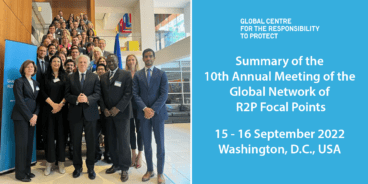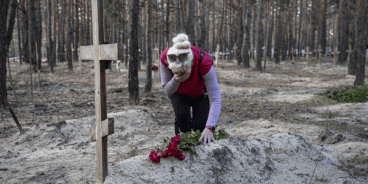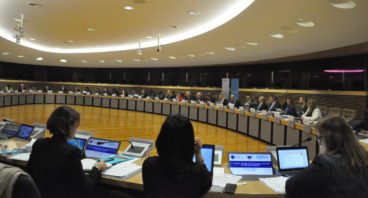
Remarks delivered at the Ninth Annual Meeting of the Global Network of R2P Focal Points
Remarks delivered by Dr. Simon Adams, Executive Director of the Global Centre for the Responsibility to Protect, on 13 May 2019 at the European Commission in Brussels, Belgium.
I would like to thank our co-hosts – Mr. Christian Leffler of the European External Action Service and Mrs. Hilde Hardeman of the European Commission. And I also want to acknowledge the staff who have worked so hard to make this meeting happen. In addition, I want to thank the government of Belgium for having us here, and also the UN Special Advisers on the Prevention of Genocide and R2P, Adama Dieng and Karen Smith, for joining us at this meeting.
Most of all I would like to thank all the R2P Focal Points who travelled far and near to be here for the 9th annual meeting of the Global Network of R2P Focal Points. In this regard I particularly want to acknowledge the presence of the new R2P Focal Point from the Organization of American States (OAS). The OAS is the second regional organization, after the EU, to appoint an R2P Focal Point.
I’d like to make some informal comments as a means of hopefully provoking discussion over the next two days. We held a Group of Friends of R2P meeting in New York recently and interestingly, the first four states to speak were all members of the UN Security Council (some elected, some permanent). They all talked about how divided and dysfunctional the Council had become. One of these states made the point that even discussing conflict prevention in somewhere like Cameroon or Burkina Faso has become controversial and that some Council members had actively blocked discussion of the deteriorating situations in both countries. And so violence is increasing, human displacement is increasing. Tensions are still increasing. And the threat of atrocities is also increasing.
Just a few days earlier, following the threat of a veto and a very diluted resolution on sexual violence in armed conflict, I had made a list of all the things that were now controversial at the UN Security Council:
1. Sexual and reproductive health.
2. ICC, R2P and POC
3. The connection between climate change and conflict
4. And now I would have to add – early action to prevent armed conflict.
Which raises the obvious point. What – other than fighting ISIS terrorists and opening the curtains at the back of chamber – is not contested and controversial at the UN Security Council these days?
There are currently 68.5 million people in the world displaced by persecution, conflict and atrocities. And the most controversial idea in the world today is not R2P – it is that human rights are universal and must be upheld equally everywhere. That means for Syrians. For Yemenis and Rohingya. But also for Uighurs in China. For Venezuelans. For Palestinians. And for people who are facing threats from the reemergence of anti-Semitism and far-right politics in Europe. And so “Lowest Common Denominator Diplomacy” around human rights and the prevention of mass atrocities will not save us. But how do we achieve an equilibrium shift? How do we improve the current situation?
To state the obvious – we need more political will to act in Syria and Myanmar. We need to improve capacity to respond to crises like Cameroon, Venezuela or Burkina Faso which are reaching a terrible threshold. But we also need to learn the lessons from positive examples like The Gambia, or other cases where early preventive action assisted in enabling a state to uphold its responsibility to protect.
Hardly anyone knows, for example, that Australia spent 14 years from 2003-2017 systematically building capacity and helping to restore order in the Solomon Islands after the government there asked for urgent help. I can hear someone at the back thinking, “but there were no atrocities in Solomon Islands.” Yes, that’s the point. Prevention works. And even when we fail to prevent the worst from happening, we should not lose sight of the fact that timely and decisive action saves lives.
Sometimes I get asked for “R2P success stories.” So, let me say that last night in South Sudan more than 182,000 people slept under the protection of armed UN peacekeepers at 6 Protection of Civilian sites across the country. Yesterday children were able to go to school in Butembo in North Kivu in the Democratic Republic of the Congo because UN peacekeepers have forced Mai-Mai militias and other armed groups out of the town. Tonight there are men and women alive in Central African Republic because other men and women in blue helmets protected their neighborhood in Bangui from being attacked by predatory armed groups. I could go on. But this is the responsibility to protect in action. This is the answer to the question, “can you show me where R2P has made a difference?”
Currently, 8 out of 14 UN peacekeeping operations have an explicit PoC or R2P mandate. That means that right now 95% of the 100,000 UN peacekeepers are upholding the international community’s responsibility to protect. And we should also acknowledge the incredible work being done by the Fact-Finding Mission for Myanmar, and by the IIIM for Syria, to try and fill the accountability gap that has opened up because of the inaction of the UN Security Council. Because when states uphold international justice (as France and Germany did recently when they arrested 3 Syrian perpetrators under the principle of universal jurisdiction) and when states strengthen justice mechanisms and human rights protections at home and abroad, they are also upholding their responsibility to protect.
I want to end with a bit of history. Just 123 kilometers from where we are sitting is a very picturesque corner of Belgium called the Ypres salient. Just 104 years ago, late in the afternoon of 22 April 1915, German troops released chlorine gas along the frontline at Ypres. About 6,000 French troops died excruciating choking deaths. That was the very first use of industrialized chemical weapons in modern warfare.
Who would have thought that in the bloody century that has passed since then, with everything we have learned and all the lives that have been lost, that we would still live in a world where chemical weapons would be used, as they have been repeatedly in Syria? And who would have thought that less than a century after the Holocaust, and 25 years after the genocide in Rwanda, that we would see genocide against the Yazidi in Iraq, and against the Rohingya in Myanmar?
The European Union is a symbol of the progress that has been made in the second half of the 20th century to advance norms of human rights and humanitarianism, and to weaken old tribal animosities. It is unquestionably a force for good in the world and an antidote to the toxic politics of the past. And so, at a time when all the norms, laws and principles that safeguard humanity appear under threat, we need states to lift their eyes and raise their expectations around promoting and protecting human rights at the UN, at home, and abroad.
Over the next two days let us turn our thoughts to how we ensure that we end this current climate of impunity and inaction with regard to mass atrocities in the world. Because another world is possible. We can do better. And we must do better.
Thank you.
Related Publications


Atrocity Alert No. 318: Ukraine, Syria and the Global Network of R2P Focal Points
